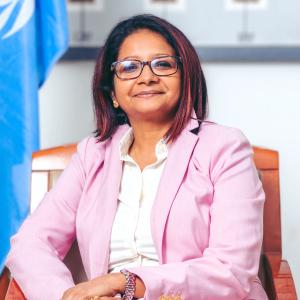Celebration of Nelson Mandela Day held at the University of Dar es Salaam
.
H.E. DR JAKAYA MRISHO KIKWETE, former president of the United Republic of Tanzania and Chancellor of the University of Dar es Salaam
H.E Judge Joseph Warioba, former Prime Minister and Vice President to the United Republic of Tanzania
Ambassador Noluthando Mayende-Malepe, the High Commissioner of South Africa in Tanzania
Ambassador Ami Mpungwe, Tanzania’s first High Commissioner to South Africa
Prof. Marcelina Chijoriga, Principal of Mwalimu Julius Nyerere Leadership School
Members of the Diplomatic Corp
My fellow UN Colleagues
Representatives from different organizations and institutions
Members of the Media
Distinguished Guests,
Good Morning!
Today, we gather here to pay tribute to the remarkable life and enduring legacy of Nelson Mandela.
This year holds special significance as it marks the 10th anniversary of Nelson Mandela's passing. We take this moment to reflect on his profound contributions and the relevance of his teachings in today's world.
Nelson Mandela's impact extended far beyond South Africa, earning him global recognition as a symbol of peace, justice, and reconciliation. His unwavering commitment to human rights continues to inspire people across nations and generations.
The United Nations acknowledges the significance of Nelson Mandela's leadership by observing Nelson Mandela International Day on July 18th, a day dedicated to promoting his values and encouraging individuals to make positive contributions to society.
As we gather here today, let us reaffirm our commitment to the principles Nelson Mandela embodied. Let us strive for inclusive societies that uphold equal rights and opportunities for all, regardless of background or circumstances. Let us work towards poverty eradication, education for all, and the protection of human rights.
Nelson Mandela emphasized the transformative power of education, stating, "Education is the most powerful weapon which you can use to change the world." Let us recognize the importance of education in driving social change and empowering individuals to shape a better future.
In the face of the challenges we currently confront, let us draw inspiration from Nelson Mandela's belief in dialogue, reconciliation, and shared goals. Together, we can address complex issues, including climate change, global health crises, and conflicts that divide communities.
Each of us has a role to play in advancing Nelson Mandela's vision. By fostering understanding, tolerance, and compassion, we can bridge cultural divides and foster a more harmonious global community.
I also take this opportunity to recall that the 75th anniversary of the Universal Declaration of Human Rights (UDHR) will be celebrated on 10 December this year. The UDHR is a foundational document that sets out the basic human rights and freedoms that all people are entitled to. It was adopted by the United Nations General Assembly on 10 December 1948.
Nelson Mandela's relevance to human rights today continues to be immense. He is a symbol of hope and inspiration for people around the world who are fighting for their rights. He showed that it is possible to overcome even the most difficult challenges through peaceful means and reconciliation. The Nelson Mandela Rules, which are the revised UN Standard Minimum Rules for the Treatment of Prisoners, were adopted in 2015 and are named after Mandela in recognition of his work to improve the treatment of prisoners.
Mandela's life and work are a reminder that human rights are universal and that everyone is entitled to them, regardless of their race, religion, or political beliefs. He also showed that it is possible to build a more just and equitable world through the power of dialogue and cooperation.
Distinguished Guests,
I would like to share with you the United Nations Secretary-General’s message for Nelson Mandela Day…
And I quote:
Nelson Mandela was a colossus of courage and conviction. A leader of immense achievement and extraordinary humanity. A giant of our times, whose legacy we best honour through action: action to expel the poison of racism, discrimination and hate; action to extinguish the legacies of colonialism; and action to promote equality, human rights, and above all, justice.
Today, poverty, hunger and inequality are on the rise. Countries are drowning in debt. The climate crisis is destroying the lives of those who have done the least to cause it, and our unfair and outdated international financial system is not fulfilling its function as a global safety net.
We have it in our power to solve each of these problems. So, as we commemorate Nelson Mandela’s life and legacy, let us be animated by his spirit of humanity, dignity and justice. Let us stand with women and girls, young people and change-makers everywhere. And let us take action to build a better world. Thank you.
End of quote.
Distinguished Guests,
Today, we are not only celebrating Nelson Mandela's life, but we are also renewing our dedication to the values he championed. By embracing his ideals, we can create a world where compassion, understanding, and respect are the guiding principles.
Nelson Mandela has left behind a legacy of hope and inspiration. He showed the world that it is possible to overcome even the most difficult challenges, and he inspired people to work together for a better future.
So, as we celebrate Nelson Mandela's life, let us also acknowledge the work that lies ahead.
Thank you for joining us in this celebration and let us carry the spirit of Nelson Mandela with us.
Asanteni Sana!
Speech by



